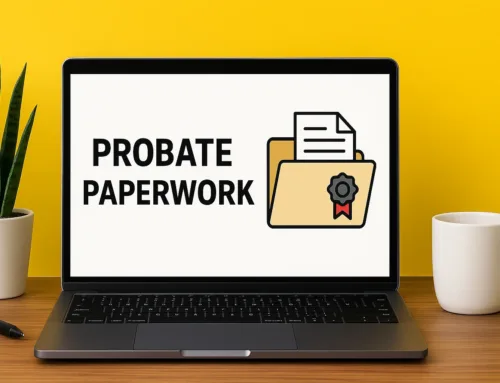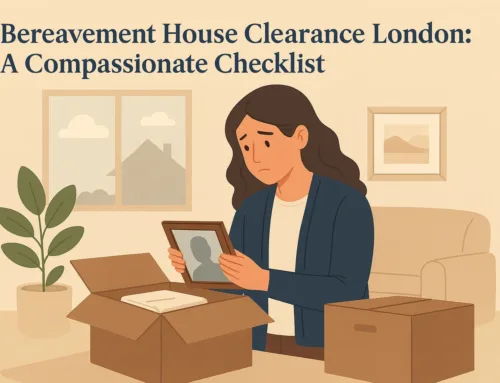Clearing a home after the death of a loved one is never easy. It involves both emotional decisions and practical tasks. This guide to bereavement house clearance in the UK explains what to expect and how to manage each stage with dignity. You’ll learn the role of executors, when probate is required, and how to reduce stress with the help of charities or professional services. By following a clear plan, families can protect the estate, save costs, and honour memories responsibly.

Key Takeaways
- Executors or next of kin usually manage the clearance process.
- Probate or Letters of Administration may be required before valuables can move.
- Costs depend on property size, labour, and disposal fees—budgeting avoids surprises.
- Donation, resale, and recycling reduce landfill while sometimes offsetting expenses.
- UK helplines and charities provide both practical and emotional support.
What House Clearance Means in the UK
A bereavement house clearance usually means removing furniture, personal belongings, and bulky waste from a home. In many cases, garages, lofts, and sheds are included. Services aim to:
- Donate useful goods to charity shops
- Sell items of value through auction or resale
- Recycle bulky or hazardous materials properly
- Dispose of what cannot be reused in line with UK waste regulations
This approach keeps the process respectful while cutting landfill waste.
When Professional Services Are Needed
Professional clearance services are most helpful when:
- The executor lives far from the property
- Time is limited before a property sale or rental
- Safety hazards (infestations, biohazards, asbestos) are present
- Large volumes of items must be processed quickly
Typical Service Process
- Initial assessment and written quote
- Sorting: items for donation, sale, or recycling
- Removal and disposal using licensed carriers
- Aftercare: donation receipts, recycling reports
Tip: Saleable goods can reduce final invoices, especially when charities run the service.
Executors, Next of Kin, and Responsibilities
The Executor’s Role
The executor protects the estate, secures the property, and arranges valuations. Duties include:
- Lock changes and insurance updates
- Creating inventories with photos
- Collecting receipts for estate accounts
- Communicating decisions to family members
When There’s No Will
If no will exists, the next of kin usually acts under intestacy rules. They may need solicitor support to apply for Letters of Administration before clearing or selling assets.
Legal First Steps: Probate and Permissions
Can You Clear a House Before Probate?
Partial clearance is possible, but high-value items should not move until probate is granted. Auction houses or accredited valuers can assess items to ensure inheritance tax compliance.
Essential Documentation
- Death certificate and will
- Probate or Letters of Administration
- Insurance details and utility accounts
- Detailed inventory with photos
Council Tax Exemptions
Most councils suspend Council Tax on empty properties during probate, with up to six months’ relief after probate if the home remains unoccupied.
Valuing Chattels for Inheritance Tax
Possessions such as jewellery, antiques, and furniture must be valued accurately. Professional probate valuations protect beneficiaries and reduce tax risks.
How to Manage Valuations
- Contact local auction houses for expert appraisals
- Photograph receipts, labels, or maker’s marks
- Record written valuations in estate files
Note: Always obtain valuations before removal to avoid HMRC disputes.
Planning a Bereavement House Clearance: Step-by-Step
When faced with a full property, it can feel overwhelming. Breaking the work into small steps makes the process easier.
- Start with security – change locks if needed and inform insurers.
- Create an inventory – photograph rooms and list valuable items.
- Seek probate advice – avoid moving valuables before legal permission.
- Sort items into categories – keep, donate, sell, recycle, dispose.
- Hire support where needed – charities, auction houses, or clearance firms.
In addition, relatives should agree early on sentimental pieces to prevent disputes later.
Before you begin, it helps to follow a house clearance preparation checklist so nothing important is overlooked.
| Stage | Estimated Time | Key Actions |
|---|---|---|
| Initial Walkthrough | 1–2 hours | Spot valuables, identify risks |
| Sorting | Multiple sessions | Categorise: keep, donate, sell, recycle, dispose |
| Packing & Labelling | ½ day per room | Use sturdy boxes, label destinations |
| Valuation & Photos | Varies | Photograph antiques, secure appraisals |
Choosing a Bereavement House Clearance Company You Can Trust
The right provider balances compassion with efficiency. A good clearance company should:
- Provide a written quote to avoid hidden fees
- Offer donation and recycling options to reduce landfill
- Have licences and insurance for legal protection
- Supply valuation services when probate requires them
Moreover, reading independent reviews and asking about charity partnerships helps confirm their professionalism.
| Feature | Why It Matters | What to Ask |
|---|---|---|
| Written Quote | Prevents hidden costs | Are disposal charges listed? |
| Recycling & Donations | Offsets fees | Which charities are partnered? |
| Valuation Services | Protects estate value | Do you provide probate valuations? |
| Insurance & Licence | Avoids liability | Can you show certification? |
Bereavement House Clearance Costs
Prices vary depending on property size, item volume, and disposal needs.
- Small flat: £400–£700
- 3-bed property: £700–£1,500
- Large home: £1,500+
Costs usually come from the estate. Saleable goods may offset fees, especially through charity-run services.
Restricted and Hazardous Items
Professional teams cannot take:
- Fuel, oils, or chemicals
- Asbestos or medical waste
- Ammunition or explosives
- Gas bottles and petrol machinery
Bulky goods such as fridges, freezers, and mattresses require specialist recycling. Always ask for disposal paperwork for estate records.
Not every item can be removed; see this guide on what you can and can’t include in a house clearance for clarity.
Support from Councils and Charities

Local Councils
Councils may assist in statutory removals, especially for social housing. Timelines are linked to tenancy notices.
Charities
Charity clearance services offer:
- Written quotes after assessment
- Weekday bookings
- Reduced invoices through resale proceeds
Private Firms
Offer flexibility and full services, though usually at higher costs.
Health, Safety, and Specialist Cleaning
Biohazards, infestations, and severe odours require trained teams. Services may include:
- Decontamination of sharps or fluids
- Pest control and follow-up treatments
- Deep cleaning with ozone or fogging systems
These add cost and time but ensure safety and dignity.
Timelines: How Long It Takes
- Small flat: ½–1 day
- 3-bed house: 1–2 days
- Larger properties with outbuildings: several days
- With valuations or auctions: extra days to weeks
Plan for flexibility and always factor in probate or legal delays.
Emotional Support During Bereavement
Sorting a loved one’s belongings is deeply personal. Protect wellbeing by:
- Working in short sessions
- Sharing decisions with relatives
- Photographing sentimental items before donating
UK Support Organisations
- Samaritans – 24/7 listening service
- Cruse Bereavement Support – specialist grief counselling
- Macmillan Cancer Support – for families affected by cancer
- Citizens Advice – financial and legal guidance
After Clearance: Preparing for Sale or Letting
Final steps include:
- Professional deep cleaning for carpets, windows, and appliances
- Compliance checks for energy performance and safety alarms
- Producing a closing inventory for beneficiaries or buyers
Estate agents familiar with probate sales can provide realistic pricing and timeline guidance.
Conclusion
A respectful bereavement house clearance follows a simple order: legal checks, valuations, and then removal. Families who use donation, recycling, and resale options not only reduce landfill but also ease financial strain. Executors should keep clear records, plan realistic timelines, and seek help when tasks feel too heavy.
Most importantly, remember that this process is about more than clearing space. With the right approach, you protect the estate, honour memories, and prepare the home for its next chapter with dignity.





